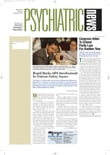Cuts in Medicare physician reimbursement produce an obvious impact on access to care, according to APA members (see story on
page 8).
The same cuts, however, can also result in more subtle changes that are difficult to identify and measure.
Last month in Washington, D.C., AcademyHealth conducted an invitational meeting sponsored by the Robert Wood Johnson Foundation to consider the question: “When Public Payment Declines, Does Cost Shifting Occur? Hospital and Physician Responses.”
In a paper commissioned for the meeting, Paul B. Ginsburg, Ph.D., president of the Center for Studying Health System Change, defined cost shifting as the “phenomenon in which changes in administered prices of one payer lead to compensating changes in prices charged to other payers for care.”
He told the audience that market power is a key factor in facilitating cost shifting. Entities, such as hospitals and physicians, must have sufficient control over their markets to be able to shift costs.
According to Ginsburg, the conditions of the mid-1990s, with extensive managed care with narrow provider networks, were not favorable to cost shifting.
Now, however, the greater concentration of hospitals and demands of the marketplace on health plans to offer broad provider networks have likely increased the market power of hospitals and of some physician specialists.
Where’s Money Coming From?
The problem, however, according to several presenters, is that although pressures for cost shifting are accelerating, there is no source from which to shift costs.
Richard Showalter, chief financial officer of the Dartmouth-Hitchcock Medical Center in New Hampshire, told attendees, “We’re back in a 1980s kind of environment here, where it’s not a question of how we shift costs to each other or to the various payers, but how we can afford the system at all.”
He told the group that the situation is “untenable” because of factors such as changing demographics, cost and availability of labor, and the increase in use of medical devices and drugs.
Robert D. Reischauer, Ph.D., president of the Urban Institute, also described a convergence of forces that threaten access to care: rising costs, falling stock markets, explosions of technology, and the transition from a period in which it was easy to wring efficiencies out of the health care system to a period in which it has become more difficult.
Donald W. Fisher, Ph.D., president and chief executive officer of the American Medical Group Association, spoke about the “huge crisis” that could occur during the next decade because of changing demographics and other social trends.
He said, “We’re going from 61 million individuals over the age of 55 today to 75.1 million over that age in 2010.”
Fisher estimates that health care will cost $8,708 per capita in 2010, as compared with $5,805 per capita in 2002, because of changes such as increased use of medications and technology and because of the aging of the population.
Stuart Altman, Ph.D., a professor of national health policy at the Heller School for Social Policy and Management at Brandeis University, said that he found “most troubling” the proliferation of niche providers. They are hospitals that serve only certain kinds of patients and offer certain kinds of services in order to maximize profitability.
The result, according to Altman, could be that community-based providers that provide care for the uninsured and Medicare beneficiaries and offer services that lose money, such as burn centers and emergency rooms, will be in “serious financial shape.”
Costs Shift to Consumers
Joan B. Trauner, Ph.D., a health care consultant who just completed a study on benefits and premiums in the individual and small-group markets in California, told attendees, “Cost shift to consumers is really where the market is.”
Employers are offering defined contribution plans in which they fix the amount they will pay, regardless of the plan costs, although their employees might have many options from which to choose.
Employees “shift into the lower-cost plans,” with high front-end costs, which they might not be able to cover if they become ill. Employees can also drop coverage for dependents.
Trauner expressed concern that an increase in the underinsured would tax the resources of publicly funded clinics because people with “bare-bones” insurance are not eligible for federal subsidies.
APA Vice President Steven Sharfstein, M.D., told Psychiatric News, “Cost shifting to psychiatric patients is especially problematic because they are often poor and unemployed. Additional financial burdens would only increase their already existing difficulties in accessing necessary and effective treatment.”
A transcript of the meeting is posted on the Web at www.kaisernetwork.org/health_cast/hcast_index.cfm. ▪
